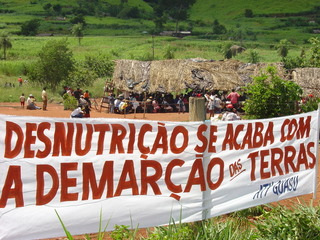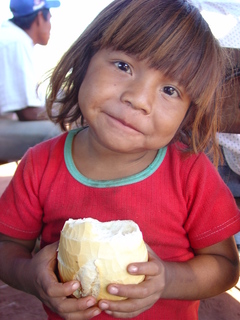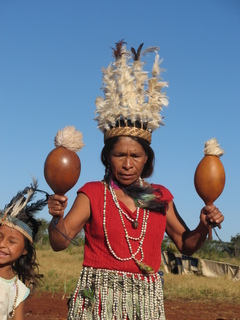Federal Court orders continuation of land demarcation
The process of land demarcation of indigenous lands in the state of Mato Grosso do Sul must continue, the Federal Court ruled, on July 14. Five municipalities in the state had requested an immediate stop of the procedures.
 The municipalities argued that an agreement between the Federal Public Ministry (MPF) and the Federal Indigenous Agency (Funai) on land demarcation, signed in 2007, should be nullified. The agreement addresses the completion of anthropological studies in 26 municipalities in the southern region of the state, for subsequent demarcation of indigenous territories of traditional occupation.
The municipalities argued that an agreement between the Federal Public Ministry (MPF) and the Federal Indigenous Agency (Funai) on land demarcation, signed in 2007, should be nullified. The agreement addresses the completion of anthropological studies in 26 municipalities in the southern region of the state, for subsequent demarcation of indigenous territories of traditional occupation.
The agreement was signed in November 2007 and stated that the demarcation of the Guarani Kaiowá lands in 26 municipalities be completed by August 2009. Until today (September 2010) the anthropological task forces have not even been able to initiate their work, because of these kind of legal law suits and because of sheer physical intimidation and threats in the field. A coordinated attempt by various opposing sectors is going on to delay or stop the demarcation process. The indigenous have been fighting for decades for the recognition of their ancestral lands.Soy and ethanol
The action was filed by the municipalities of Tacuru, Sete Quedas, Naviraí, Iguatemi and Juti, in the southern cone of Mato gGrosso do Sul. The struggle for land demarcation is particularly fierce in this region, because of the huge economic interests. It is an important soy and sugar cane (for ethanol) producing area. The municipalities argued that they should have active participation in the agreement, because these would be affected by the eventual demarcation of indigenous lands, and that the right to full defense has not been respected.
 Constitutional obligation
Constitutional obligation
However, the judge dismissed the claims as unjustified. Following the argumentation of the Federal Public Prosecutor, the judge ruled that neither the studies nor the TAC itself should be annulled, because they derive from the Federal Constitution. The constitution of 1988 determined that the demarcation of indigenous lands were to be carried out within five years, throughout the entire country.
The court added that the right to ample defense of all interested parties in the question (state, municipalities and third parties) had not been breached. "The process of demarcation, since its inception, can and should be accompanied by all stakeholders, there being no deadline for this opportunity (…). The author did not provide proof of the violation to this opportunity or right."
The participation of land owners in the areas at stake, municipalities and the state, in elaboration of the TAC was considered unnecessary, as the obligation to carry out the demarcation of indigenous lands is imposed by the Constitution and not by the document signed between the MPF and Funai. "This is not a question of contractual obligation (…) but of an imposition of the law."
A greater right
The judge wrote in the ruling that "there is a constitutional commitment to the protection of the indigenous communities" and that the suspension of Funai directives "would amplify the various hardships that fall to the indigenous population, a fact evident in the southern cone of the state of Mato Grosso do Sul", therefore, "the understanding of the author [would be] inapplicable, which superimposes the interest of the municipality on a greater right, assured constitutionally to the indigenous population"
Violence
For Federal Prosecutor Marco Antonio Delfino de Almeida, demarcation is crucial to solving the serious problems faced by the indigenous peoples of Mato Grosso do Sul. The state has the second largest indigenous population in the country, about 70,000 people, divided into various ethnicities. The infant mortality rate among the Guarani-Kaiowá ethnicity is 38 per thousand live births, while the national average is 25 deaths per thousand births. The murders rate – one hundred per hundred thousand inhabitants – is four times higher than the national average, while the world average is 8.8. The suicide rate among the Guarani-Kaiowá is 85 per hundred thousand, according to the prosecutor.
Cultural survival
In Dourados, there is a reserve of circa 3.6 thousand hectares, created in the 1920s, where the Guarani Kaiowá were confined. Their traditional lands were given out or sold to ranchers. There are two villages – Jaguapiru and Bororó – nowadays with about 12,000 people, a fast ever growing population. The demographic density is of 0.3 hectares per person, which is extremely little compared to their traditional lands. The confinement makes the continuation of their customs and cultural habits impossible. Prosecutor Marco Antonio comments: "this demographic condition is comparable to true human confinement. In such diminutive spaces social, economic and cultural reproduction is impossible.” The cultural survival of the Guarani kaiowá is at stake.
Photos:
1 – "Malnutrion is stopped by land demarcation" Banner extended at an Aty Guassu (Traditional Guarani Assembly) at the village of Cerro Marangatu demanding the demarcation of the traditional lands – by Egon Heck, Cimi Archive
2 – The children inalienable part of the Guarani daily life come along to the political meetings, like this girl at the Aty Guassu of Cerro Marangatu – by Egon Heck, Cimi Archive
3 – Cerimony, at Jatawari – Lima Campo – by Egon Heck, Cimi Archive

